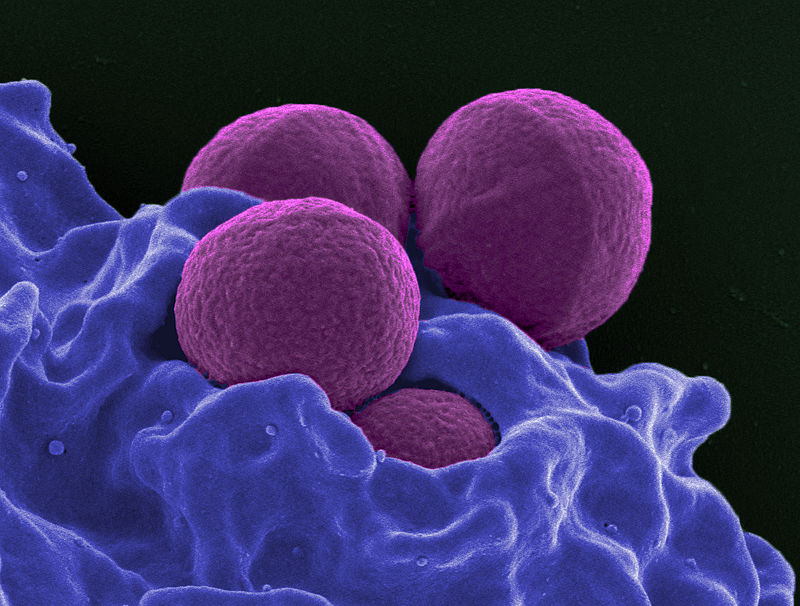MRSA infection is a medical condition caused by methicillin-resistant Staphylococcus aureus (MRSA), a type of bacteria resistant to methicillin, tetracycline and erythromycin. The infection tend to occur in elderly and people with weakened immune systems such as HIV / Aids victims, cancer patients, and patients in hospitals or long-term care facilities. MRSA infection is also common among patients receiving kidney dialysis and antibiotherapy for a prolonged period of time.
Staphylococcus aureus, also known as staph, is a bacterium that lives in the nasal passages and on the skin of most people. If you are healthy or your immune system is strong, you do not develop the infection even if you are carrying staph. However, certain factors such as skin cut or sore and use of catheter or breathing tube can cause the bacteria to enter your body leading to staph infection.
MRSA Infection Causes
Depending on the place the comtamination occurs, staph infection can be Healthcare-associated MRSA (HA-MRSA) infections or Community-associated MRSA (CA-MRSA) infections:
Healthcare-associated MRSA (HA-MRSA) infections – these types of MRSA infection happen in general during hospital stay, mostly for a prolonged treatment. The contamination is mainly done through the hands and clothing of health care providers who become contaminated by contact with infected patients and transmit the germs to other patients. It is estimated that about 55% of hospital personnels are contaminated with staph bacteria after being in contact with an infected patient.
Community-associated MRSA (CA-MRSA) infections – MRSA infection may be of Community origin; it is rare, however. You can be a carrier of CA-MRSA for years without being sick; meanwhile, you can spread the bacteria to others who may fall sick. CA-MRSA can cause serious infection on your skin, soft tissue and even your lungs (pneumonia). This type of MRSA infection mostly occurs among athletes who share personal items (socks, towels, underwear or razors) those who are in military, children in daycare facilities, and individuals who do tattoos and body piercings.
Community-associated MRSA (CA-MRSA) is transmitted by direct physical contact with an infected individual or by contact with objects contaminated with infected body fluids. In addition, if you have MRSA on your hands after touching an infected person or a contaminated surface, you can spread the bacteria to others if you do not properly wash your hands.
People at Risk
Any scratch, cut or other injury to the skin is a gateway to staph inside your body and facilitates the development of serious infections. People especially at risk are those living in environment favoring the transmission of the bacteria:
- Schools
- Kindergartens
- Sports clubs
- Gyms
- Military camps
- Prisons
- Nursing homes
- Dialysis centers.
MRSA Infection Symptoms
If you have a moderate staph skin infection, you will likely have:
- Fever
- Skin abscess
- Skin redness and swollen
- Drainage of pus or other fluids from the infected areas
- Pain and/or warmth in the infected areas
If you have serious Staph skin infections, you may experience:
- Chills
- Fever
- Cough
- Fatigue
- malaise
- Headache
- Skin rash
- Muscle aches
- Chest pain
- Shortness of breath
MRSA Infection Complications
CA-MRSA can cause severe skin and soft tissue infections. Some CA-MRSA can produce a fetal cytotoxin called Panton Valentine Leucocydine (PVL), which attacks destructively the white blood cells and cause tissue destruction, especially in the lungs. This complication tends to lead to a serious pneumonia, which leads, in the majority of cases, to death within days. In addition, severe staph infections may lead to:
- Sepsis , a serious blood infection
- Endocarditis, inflammation of the heart valves
- Organ failure
MRSA Infection Diagnosis
A physical exam may be the first step in the diagnosis of MRSA infection. During the examination, your doctor will seek for signs indicating staph infections.
Your physician may also take a tissue sample or nasal secretions to examine under microscope. A blood or urine tests can be recommended to detect signs of drug-resistant bacteria. Except one that has just been approved by the U.S. Food and Drug Administration (FDA) which can give the result in about 2 hours, most of the MRSA infection exams take up to 48 hours to give the result.
MRSA Infection Treatment
Minor or moderate staph infections may not requires any drug treatment. However, high dose of antibiotics may be used if you have severe infections. Severe infection, especially HA-MRSA infections, can be difficult to be treated because usual antibiotics cannot kill the germs.
Usually, your health care provider will use strong medications such as:
- Vancomycin
- Daptomycin
- Clindamycin
- Linezolid (Zyvox)
- Minocycline
- Tetracycline
- Doxycycline
When used as prescribed, those drugs can be very effective. In addition, treatment should be associated with good hygiene (particularly hands washing) and isolation of infected individual to avoid re-infection.
In some cases, you surgeon may decide to perform a surgical draining of pus
Alternative Treatment
• Take turmeric powder 2-3 times a day (½ tbsp mixed in ½ cup of warm water). To avoid constipation and dehydration, increase your fluids intake when taking turmeric. In addition, it is better to take the turmeric with zinc and magnesium
• Avoid sugar, coffee, alcohol, chocolate, peanut, and pork meat
• Taking colloidal silver internally and externally may also fight the infection
• Drink turmeric tea 3 times a day
Prevention
• Use antibiotics appropriately and when it is necessary
• Boost Your immune system
• Avoid contact with other people’s wounds or bandages
• Keep your hands clean by washing them thoroughly with soap and water
• Avoid contact with skin, clothing, and any items that may have staph germs
• Keep cuts and abrasions clean and covered with sterile, dry bandages until healed
• Avoid sharing personal items such as towels, sheets, razors, clothing and athletic equipment.



